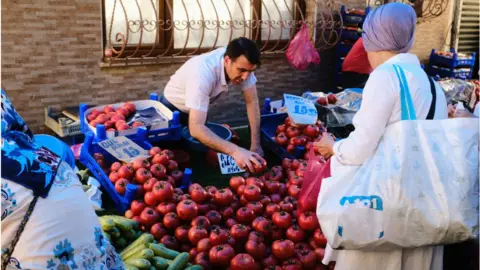Inflation in Turkey surges to 83%
 Getty Images
Getty ImagesInflation in Turkey has climbed above 83% - a 24-year-high.
The transport, food and housing sectors have seen the biggest rise in prices.
Independent experts the Inflation Research Group estimate the annual rate is actually 186.27%.
Last year Turkish President Recep Tayyip Erdogan took the unorthodox step of cutting interest rates to try to boost the economy. Most central banks raise interest rates to fight inflation.
The transport sector saw the sharpest increases in annual prices at 117.66%, followed by food and non-alcoholic drinks at 93%.
Mr Erdogan has described interest rates as "the mother and father of all evil", and his economic policies include intervening in foreign exchange markets.
Last year's cut in interest rates from 19% to 14% has led to a fall in the value of the Turkish lira, which means it costs more for the country to import goods from abroad.
The lira, meanwhile, hit a new record low of 18.56 against the US dollar.
US Banking giants JP Morgan said Turkey's inflation would remain in the "abnormally high range until policies get orthodox".
"We will build the century of Turkey together, hopefully by overcoming the inflation issue," said Mr Erdogan in a televised address on Monday.
The record high is the sharpest inflation surge since World War Two, according to former Turkish central bank chief economist Hakan Kara.
High inflation and the economic crisis is the main problem facing Mr Erdogan's ruling party, as he looks to secure another term in next year's election.
Prices are rising quickly around the world, due to factors including Covid-related supply shortages and the Ukraine war, which has driven energy and food prices higher.
